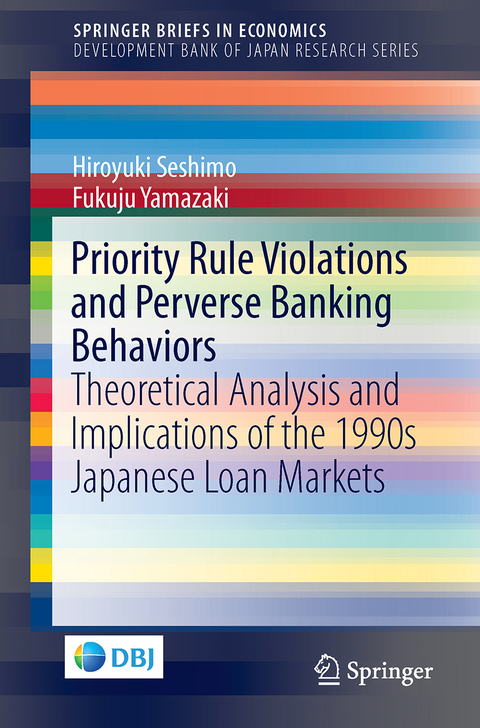
Priority Rule Violations and Perverse Banking Behaviors
Springer Verlag, Singapore
978-981-10-5851-6 (ISBN)
In Japan, the APR has often been violated legally by courts and some governmental acts. Examples from the 1990s involve legal abuse in the form of short-term tenancy protection (tanki chinshaku ken) and political intervention in the liquidation of Housing Loan Companies, or Ju-sen. The Supreme Court of Japan has issued critical decisions leading to serious violations of APR in the early 1990s. Evidence provided here supports theoretical results. Empirical testing for a significant difference in banking behavior before and after the Court decision using data from Japanese firms in the 1980s and 1990s found that theoretical arguments were empirically supportable in the last half of the 1980s and through the 1990s. Finally, based on their analysis, from the theoretical point of view the authors consider the optimal legal scheme to achieve the best assessment of initial and additional lending in light of the legal reform of the 2000s.
Hiroyuki Seshimo is a professor of economics and finance at Senshu University and visiting scholar of the Research Institute of Capital Formation, Development Bank of Japan. His main areas of research are finance, urban economics, law and economics, and monetary economics. Born in 1967, Prof. Seshimo received a Bachelor’s degree in economics from Sophia University in 1990 and a Ph.D. in economics from Keio University in 2004. He was appointed professor of economics at Senshu University in 2005. Fukuju Yamazaki is a professor of economics at the College of Economics, Nihon University of Tokyo; His research areas are urban economics, land and housing economics, and law and economics. Born in 1954, He received a Bachelor’s degree in economics in 1976 and a Ph.D. in economics from Sophia University of Tokyo in 2000. He was a lecturer, an assistant professor and a professor of economics at Sophia University from 1983 to 2012 and appointed a professor emeritus of Sophia University.
1 Introduction.- 2 Examples of APR violation in Japan in the 1990s.- 3 Fundamental Structure of our Model and the Result in the Case with No APR Violations.- 4 Economic Analysis of Excess Additional Credit (Loan Evergreening).- 5 Empirical Evidence.- 6 DIP Finance, Optimal Priority Rule, and Implications for Japanese Legal Reforms.- 7 Concluding Remarks.
| Erscheinungsdatum | 27.09.2017 |
|---|---|
| Reihe/Serie | Development Bank of Japan Research Series | SpringerBriefs in Economics |
| Zusatzinfo | 4 Illustrations, color; XI, 80 p. 4 illus. in color. |
| Verlagsort | Singapore |
| Sprache | englisch |
| Maße | 155 x 235 mm |
| Themenwelt | Geschichte ► Teilgebiete der Geschichte ► Wirtschaftsgeschichte |
| Wirtschaft ► Betriebswirtschaft / Management ► Finanzierung | |
| Betriebswirtschaft / Management ► Spezielle Betriebswirtschaftslehre ► Bankbetriebslehre | |
| Wirtschaft ► Volkswirtschaftslehre ► Finanzwissenschaft | |
| Schlagworte | Banking theory • Credit Crunch • Priority Rule |
| ISBN-10 | 981-10-5851-2 / 9811058512 |
| ISBN-13 | 978-981-10-5851-6 / 9789811058516 |
| Zustand | Neuware |
| Haben Sie eine Frage zum Produkt? |
aus dem Bereich


